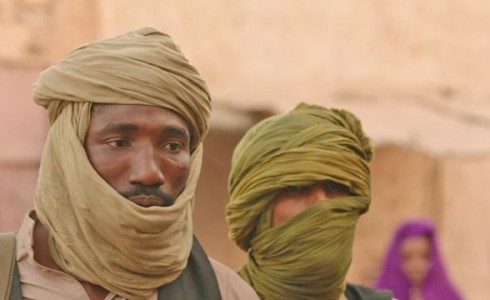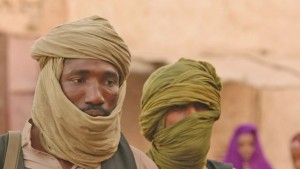Movie a Day Blog finds it not so remarkable that TIMBUKTU (2014, Theatrical) is the first African film nominated for an Oscar directed by a non-white director. After all, look at this year’s slate of lily-white nominees in all the creative categories of the Academy Awards, and the Academy’s failure to honor a native African filmmaker before now comes as no surprise.
If the inevitable had to happen, TIMBUKTU is a great film to choose. It’s an example of moviemaking through a lens completely different from our own. Mauritanian director Abderrahmane Sissako sets his story in Mali and its scholarly center Timbuktu, long a synonym for an exotic foreign locale that was distinctly non-Western.
What’s shocking about TIMBUKTU is its immediate and total acceptance of daily life under an Islamic rebel army and Shariah law. It’s simply presented as the reality the Malian people live under (the film was shot in Mauritania, in western North Africa), and for the first time that I’m aware of in a fictional film, we see how their society functions.
Sissako seems deadly accurate in his portrayal of rigid men, always in turbans and face scarves, who ban music, dancing, any display of flesh by women and generally anything modern. Yet they also argue about France’s soccer team (their colonial occupier) and one leader displays an uncomfortable yen for another man’s wife. He’s powerful, so nothing comes of it; in one of the film’s most disturbing sequence, we see a convicted adulterous couple stoned to death before our eyes. It is not easy to watch, nor is the flogging of a woman who wails a song as she is beaten.
Yet Sissako succeeds in humanizing all of his characters, especially the one family that remains when all their neighbors have apparently fled. Imbrahim Ahmed as Kidane, a cattle herder with a sharp, loyal wife and a lovely daughter, does his best to avoid the Islamist rebels (the story’s setting in Mali is accurate for 2012-13), but a dispute with a neighbor leads to violence and a sudden and jarring encounter with the brutal reality of Shariah law.
The power of Sisako’s dynamic storytelling builds and builds, yet he also has time for lyrical moments, like an Islamist soldier taking off his headscarf and dancing like a male ballet star. The cinematography by Sofiane El Fani is superb, crystal-clear and always revealing what is happening in the frame without overt comment.
We are left to form our own conclusions — unlike many Western filmmakers, Sissako feels in no rush to make us accept a message or lament about the life-choking aspects of fundamentalist Islam. Yet we also see common people whose Muslim faith is paramount in their lives, and defines them just as much as radical Islam defines their overlords.
TIMBUKTU has an uphill struggle in a very strong year for the Best Foreign Language film award, but I have not been able to get it out of my mind since seeing it, and it affected me profoundly. So did LEVIATHAN (2014, Movie a Day Blog 2/8/15), which will leave me pondering my options. IDA (2014) was also an exceptional film, and I have yet to see the Estonian and Argentinian entries.
One thing is clear: foreign filmmakers are making more provocative and inspiring movies than their American counterparts at this point in time. We need to be looking abroad for cinematic inspiration.



Comments are closed